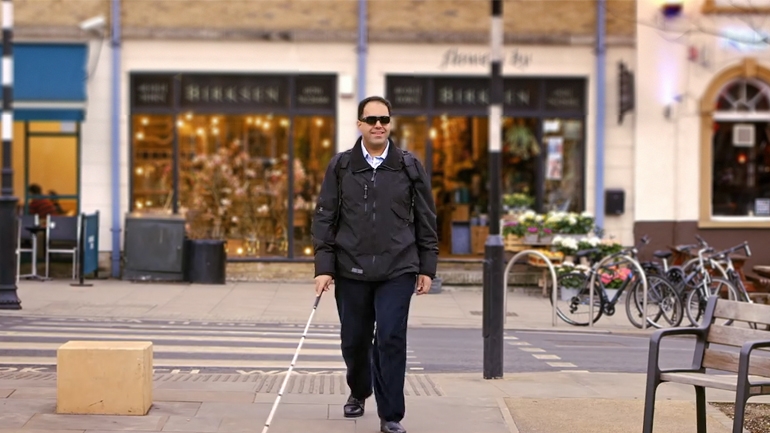Through artificial intelligence (AI) humans and machines are increasingly working together to help solve social problems, and to make the world a more inclusive place.
Saqib Shaikh is one of the engineers working to better everyday life through AI as a Software Engineer and Tech Lead for the Seeing AI application at Microsoft. Before speaking at the Elevate AI conference in Toronto this week, we spoke with Shaikh about his work removing barriers for people with low vision using AI, how the technology can be used for global good, and what to expect at the conference.
Q: How has AI helped to better your life?
A: Technology has always been an equalizer for me. As someone who is blind since childhood, I still remember that first time that I used a computer that read to me, or the ability to independently write a printed document that others could read. While the definition of AI has shifted over the years, I see technology as an equalizer, because when I'm on the internet or behind the keyboard my work is indistinguishable from someone else's.
That trend has continued throughout my life. My team's work on the Seeing AI app is leveraging deep learning to understand images and provide descriptions for the blind community. Seeing AI is a talking camera app for iPhones, aimed at people with a visual impairment - it can describe the text, people, and objects around you.
Q: How would you define AI for good to someone who has never heard of it?
A: It's about how AI can remove barriers and make the world a more inclusive place. It might be translating languages you don't understand or details about sounds in a visual format for someone who is hard of hearing. For someone with autism, for example, it could aid in better understanding social cues.
Some of these are still a little ways off but each year we get closer to executing on this vision and that's really exciting.
Q: As an engineer, you've worked on AI solutions that empower the blind and low vision community. What other applications of AI that will improve people's lives or help solve societal problems do you find most exciting?
A: It's hard to pick one, I’m not an expert in these areas. There's some interesting work in agriculture to ensure we have a better food supply to feed the growing population. Using sensors to tell us about soil health for example, or drones, and machine learning to increase yields and reduce pesticide use. There's also projects looking at how to enable doctors to make more informed decisions and provide better diagnostics by using computers to identify patterns from large amounts of historical data.
Education is another area. Right now, our system is based on teaching everyone largely the same way, with limited access to tailored or customized programs based on learning styles or abilities. AI could help to customize the way this information is presented.
Q: Let's talk about where AI and empathy intersect. AI for good relies on empathy to design solutions that are helpful to humankind, but empathy is a human thing. What challenges must we work through to integrate a human response into a robotic or data-driven process?
A: It's important for humans and machines to work together because that combination is much more powerful in solving problems.
In my own work with Seeing AI, a key principle is that we provide people with additional information. We aren't setting out to tell the user what to do, as they are capable and independent. I think this concept of augmenting abilities, rather than replacing them through AI is going to be key.
Q: What worries or concerns you regarding AI applications or how the industry is developing?
A: Because machine learning relies on the data we present them with, there is a risk that the system will learn any human biases present in the data. We've seen examples, like early facial recognition systems, that were better at recognizing faces of a lighter complexion because the training data had more examples of that sort, rather than a complete reflective sample of the world. There is a lot of work being done that looks at the social impact of AI and how we can counteract these types of biases, so we can create fair systems for all. The Fairness, Accountability, Transparency and Ethics (FATE) group at Microsoft is looking into this.
Q: What is your AI dream for mankind?
A: To find cures for diseases, increase food production and distribution, to empower people with disabilities with new solutions, and provide customized education to suit all learning styles. Oh, and perhaps a robot to fetch a Diet Coke from the fridge?
Q: What are you speaking about at the Elevate conference. If people took one thing away from your talk, what should it be?
A: I will be talking about how AI can empower everyone. Throughout my life, as someone who is blind, I have benefited from advancements in technology enabling me to be an equal player at school, work, and home. Let's now look at the next generation of technologies powered by AI and how this can be applied more broadly.
I believe the best solutions come about when scientists and engineers work alongside people with problems and we make sure to keep that human consideration in all our designs. The amount of possibilities for solutions then is limitless.
The Elevate AI conference, sponsored by TD and Layer 6, is a showcase of Canada's top AI talent and aims to equip students as future leaders in this industry with the skills needed for the jobs of tomorrow.
